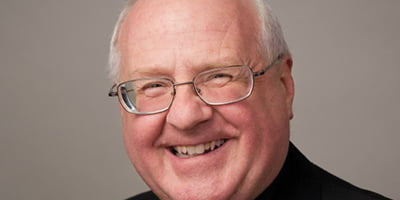
Father Mark Goldasich is the pastor of Sacred Heart parish in Tonganoxie. he has been editor of the Leaven since 1989.
by Father Mark Goldasich
“Paper, please.”
Say these two words in the checkout line at the grocery store and you’re just about guaranteed a double take from the sacker.
The question — “Paper or plastic?” — seems like a rhetorical one nowadays. It’s assumed you’re going to answer, “plastic.” Usually, the sacker is already opening the mouth of said container while the question is still being asked. “Paper” disrupts the rhythm of checking out. The poor sacker is thrown off guard and has to reach in another — usually out-of-the-way — compartment to get a paper bag. You might even be treated to a look that says, “What a Neanderthal; nobody wants a paper bag anymore!”
Choosing paper over plastic is just one small way that I hope to care for the environment. Once emptied, that paper bag is “repurposed” to collect recyclable items like magazines, newspapers, junk mail and scrap paper, which then head to a recycling bin.
This coming Sunday is Earth Day. While not on the church’s official calendar of celebrations, caring for our planet fits right in with our faith. In fact, the first words of the Bible tell the story of the seven days of creation. Not only do human beings have the fingerprints of God on them, all creation is touched by God.
We sometimes forget this. Often it takes something ominous, like the out- break of tornadoes last weekend here in the Heartland, to get our attention. But God’s wonders in creation surround us every day.
The famous orator William Jennings Bryan reminded us of that fact when he said: “Have you ever observed the power of the watermelon seed? It has the power of drawing from the earth and through itself 200,000 times its own weight! Can you tell me how it takes this material and out of it colors an outside surface beyond the imitation of art, and then forms inside itself a white rind, and within that, a red heart, thickly inlaid with black seeds, each of which in turn is capable of drawing through itself 200,000 times its own weight? When you can explain to me the mystery of the simple water- melon, then you can ask me to explain to you the mystery of God.” (Found in Brian Cavanaugh’s “The Sower’s Seeds.”)
Makes you really think, doesn’t it? And that is one of the major purposes of Earth Day: to make us aware of this world that we so often take for granted and fail to respect.
Caring for our home planet, being good stewards, doesn’t need to be com- plicated. A book that I’ve mentioned here before — “5001 Simple Things
to Do for Others (and Yourself)” by Liguori Publications — has a number of sections devoted to activities ap- propriate for Earth Day and beyond. Some suggestions you’ve heard before, like: walking or riding a bike, instead of driving; combining trips when you run errands; carpooling; picking up litter; turning off lights that you’re not using; or saving paper by printing on both sides.
But there are other things to do that you might not have thought of, such as:
• Buy products with less packaging or buy in bulk.
• Recycle old batteries or purchase rechargeable ones.
• Organize a Clean Up the Parish committee (and, no, this doesn’t mean dumping your old pastor).
• Don’t turn on the TV unless you’re watching it.
• Store food in reusable containers instead of plastic wrap or aluminum foil.
• Reinstall a clothesline and hang clothes outside to dry.
• Ask your pharmacy how to safely dispose of expired or unused meds (in- stead of flushing them down the toilet or sink).
• Turn the water off when brushing your teeth.
Another favorite book of mine, ap- propriate for Earth Day as well, comes from Reader’s Digest and is called, “Extraordinary Uses for Ordinary Things.” Basically, this is an A-to-Z guide — from adhesive tape and Alka-Seltzer to zippers and zucchini — on new ways to (re)use common household items.
As an example, let’s take those pesky plastic grocery bags that you’ve got all over the house. (It’s OK; I know that you just forgot to say “paper” at your last shopping trip.) The book suggests many ways to “repurpose” them. These bags can be used to line a cracked flower vase; stuff crafts or pillows; make party decorations; treat chapped hands; make bibs for kids; pick up the phone (when you’re up to your elbows in dough while baking and get a call); spin dry salad greens; protect your shoes from mud; or pack your shoes when traveling.
Back in 2010, Pope Benedict said, “If you want to cultivate peace, protect creation.” This Earth Day, let’s resolve to do whatever we can — no matter how small — to treat our planet better, to respect it as a priceless gift from God to us. Doing so will not just preserve nature, but civilization as well.

